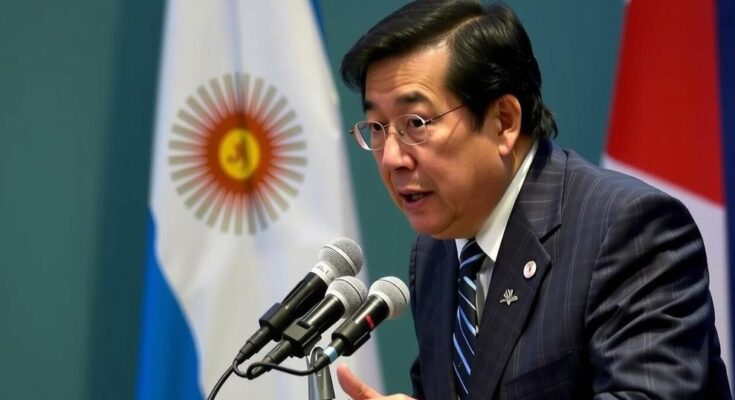Javier Milei, President of Argentina, has dismissed his foreign minister, Diana Mondino, after Argentina voted in favor of lifting the U.S. embargo on Cuba at the UN. This marked a departure from previous policies, with the new foreign policy prioritizing opposition to the Cuban regime and aligning with Western democratic values. Gerardo Werthein has succeeded Mondino as foreign minister, reflecting Milei’s strategic shift in foreign relations.
President Javier Milei of Argentina has dismissed foreign minister Diana Mondino following the country’s supportive vote at the United Nations to lift the U.S. economic embargo against Cuba. This decision marked a notable deviation from Argentina’s prior alignment with the United States and Israel, as it was the first instance since President Milei took office that Argentina diverged from their stance. The non-binding UN resolution received the backing of 187 nations, with only the U.S. and Israel opposing it. Mondino, who has now been succeeded by Gerardo Werthein, Argentina’s ambassador to Washington, had a history of dampening diplomatic tensions following President Milei’s sometimes confrontational rhetoric towards other nations. In a statement released after her dismissal, President Milei’s office declared that Argentina is “categorically opposed to the Cuban dictatorship.” This shift in policy aligns with the president’s new diplomatic vision, emphasizing adherence to the values of freedom, sovereignty, and individual rights found within Western democracies. Milei’s administration contrasts sharply with that of his left-wing predecessor, which maintained strong ties with Cuba, advocating for the annulment of the embargo that has been in place since the 1960s due to Cuba’s communist orientation. Historically, Cuba has supported Argentina’s claims over the Falkland Islands, a territory controversially claimed by both Argentina and the United Kingdom, leading to military conflict in 1982. Observers note that disagreement has been burgeoning between President Milei and the foreign ministry on various matters, contributing to Mondino’s unexpected replacement.
The economic embargo imposed by the United States on Cuba dates back to the early 1960s, following the revolution that brought Fidel Castro to power. The U.S. aimed to induce a shift away from socialism toward capitalism and democracy in Cuba, yet the embargo has since become a contentious issue within the region, often criticized for its ineffectiveness. Under previous administrations, Argentina fostered a collaborative relationship with Cuba, strategically supporting resolutions to end the embargo, which reflected a broader regional solidarity against U.S. policies. The political landscape in Argentina has recently shifted with the election of Javier Milei, whose administration rejects previous alignments and advocates for a foreign policy consistent with democratic values and human rights.
In conclusion, the sacking of Diana Mondino by President Javier Milei signifies a significant shift in Argentina’s foreign policy stance towards Cuba and reflects a broader realignment of diplomatic relations under his administration. The decision underscores a departure from previous pro-Cuba policies, emphasizing a strong opposition to the Cuban government while promoting a foreign policy rooted in Western democratic values. This strategic pivot from the prior administration’s approach towards Cuba may have lasting implications for Argentina’s international relationships, particularly with the United States.
Original Source: www.bbc.co.uk




